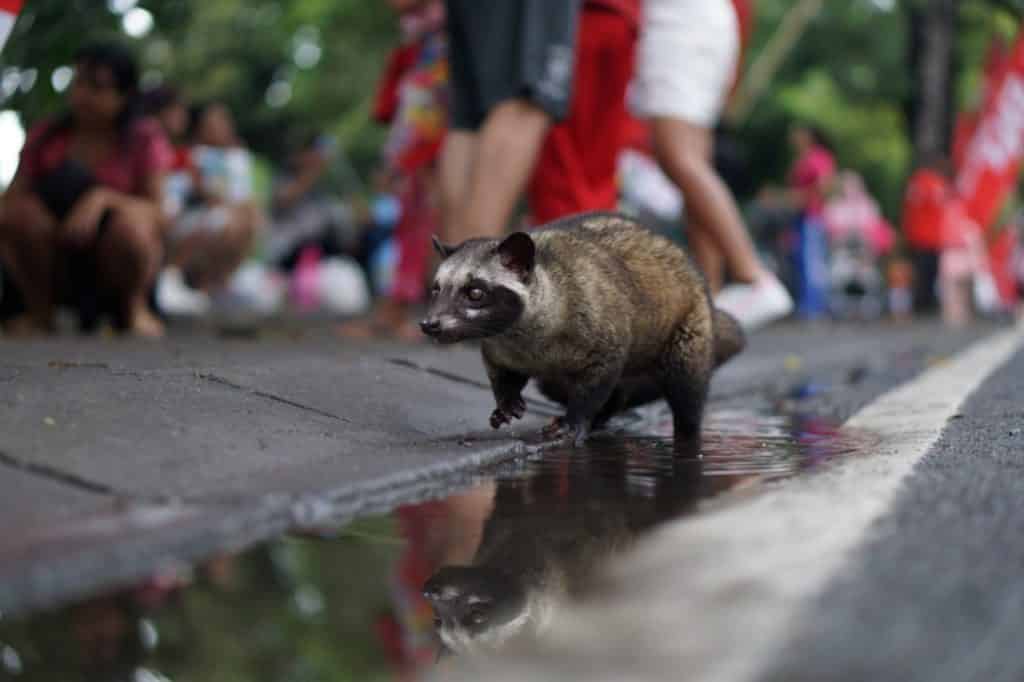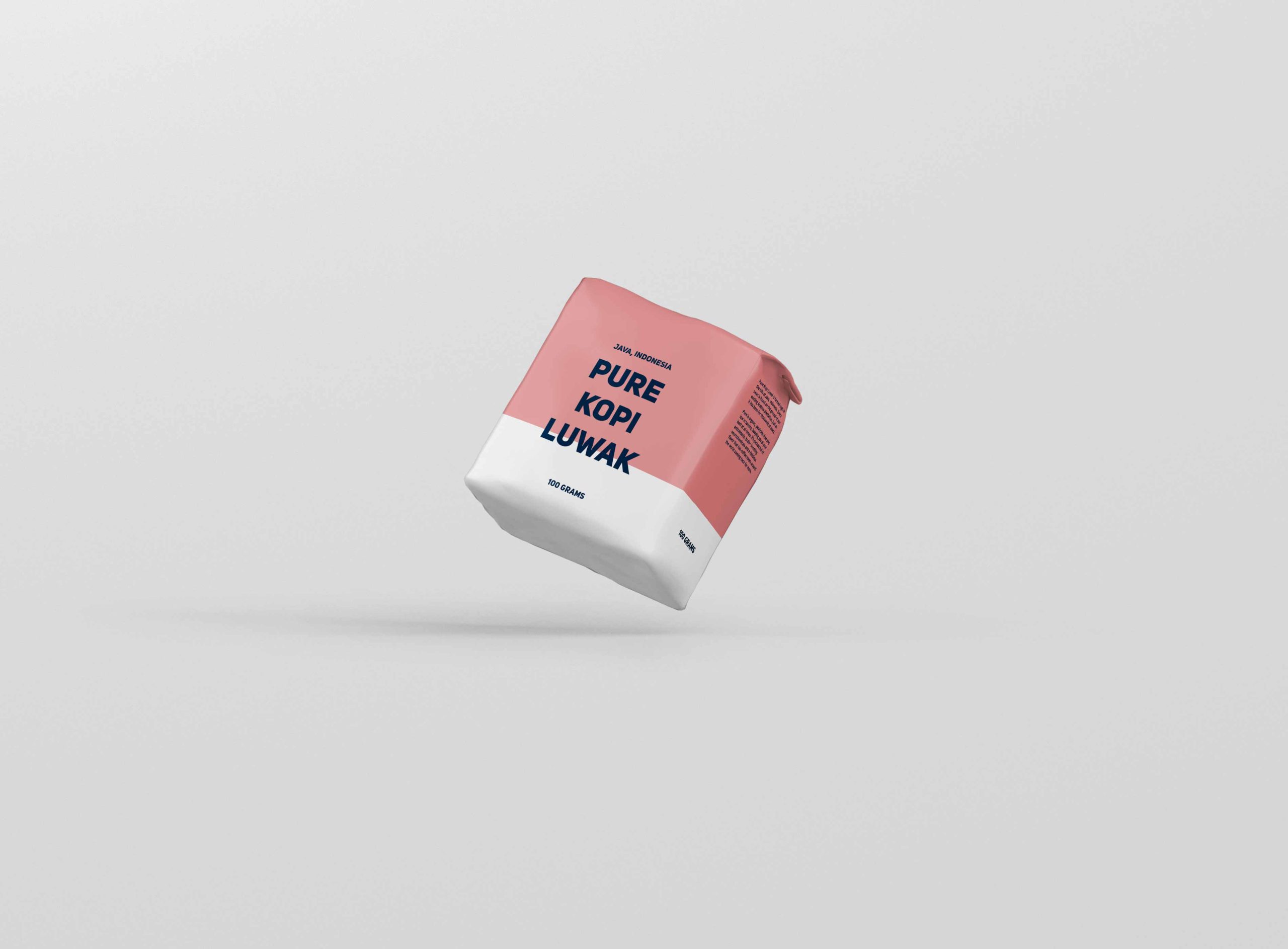If you’re a coffee lover, you’re bound to have heard of kopi luwak. You might have also heard about “monkey poop coffee” and been wondering what it is. Fortunately, you’re about to find out.
Let’s get one thing straight from the very start: there’s no such thing as monkey poop coffee. When someone says monkey poop coffee (or sometimes monkey dung coffee), they’re talking about kopi luwak, which doesn’t technically come from monkeys, but rather from Asian palm civet cats, a small cat-like animal native to certain parts of Southeast Asia.
In this article, we’ll give you everything you need to know about “monkey poop coffee” (a.k.a. kopi luwak), including links to all of our posts on the various details that make civet coffee the top choice for coffee lovers seeking a distinctive, exotic flavor combined with more health benefits than any other coffee on the market.

What Is Monkey Poop Coffee?
Monkey poop coffee is a special kind of coffee prepared from coffee beans that have been eaten, digested and defecated by the Asian palm civet cat (known in Indonesia as the “luwak”), a small cat-like mammal that enjoys eating ripe, luscious coffee cherries. The pooped-out coffee beans, protected by a thin parchment because digestion doesn’t destroy the bean’s tough outer husk, are then washed, dried, husked and roasted to make for a delicious cup of coffee. The special thing about civet coffee is the fermentation process that occurs in the digestive tract of the civet, which gives civet coffee a uniquely desirable taste and aroma and cuts its caffeine content in half when compared to any other cup of joe.

Civet coffee is a type of fermented coffee produced mainly in southeast Asian countries like the Philippines, Vietnam and Indonesia. To make things confusing, each country has given civet coffee its own name: the original name, kopi luwak, stems from Indonesia, and is a literal translation to civet (known locally as the luwak) coffee (kopi). In Vietnam, it’s called cà phê chồn, the first two words meaning coffee and the third being a term used for mink, ferret or weasel (the civet is actually more closely related to the weasel than to the cat). Finally, in some of the Philippine islands it’s known as kapé alamid or kape motit. Thanks to the great 2007 film starring Jack Nicholson and Morgan Freeman, civet coffee is also known to some as Bucket List coffee. Some people even call it cat poop coffee, for obvious reasons.
What’s So Special About Monkey Poop Coffee?
Kopi luwak has become famous for several reasons aside form its price, exoticity and Jack Nicholson. Some of these reasons include its excellent taste, aroma and health benefits. Some of these characteristics are common to all fermented coffees, whereas others are unique to kopi luwak:
- Taste of civet coffee: Kopi luwak is less bitter than regular coffees, and it’s been described by professional cuppers as earthy, syrupy, smooth, and rich with chocolate and jungle undertones.
- Health benefits of civet coffee: These include higher levels of inositol (which improves the effects of neurotransmitters, fights polycystic ovarian syndrome, combats depression and more), higher levels of citric acid (which avoids kidney stones, osteoporosis and more) and higher levels of malic acid (which boosts your energy).
- Half the caffeine of other coffees, which gives you plenty of energy without the caffeine crash
- Far fewer tannins, making civet coffee much healthier for your teeth
- Less likely to produce coffee heartburn
Some people find the idea of brewing civet coffee too exotic (let alone drinking it) but before you think about passing on kopi luwak, consider these important facts:
- Fact #1: Every coffee in the world undergoes some kind of fermentation before it reaches your cup. The only difference with civet coffee is that this fermentation process occurs inside the civet’s belly.
- Fact #2: Pure Kopi Luwak beans are thoroughly washed multiple times, and the roasting process kills or destroys any possible pathogens (harmful substances or bacteria) that might have escaped the washing, making civet coffee perfectly safe to drink. Indonesians have been drinking kopi luwak for centuries—and loving every cup!
- Fact #3: Putting your imagination aside, civet coffee doesn’t taste “strange” or “off.” It still tastes like coffee only sweeter and, according to most people who try it, better.
There’s a reason why people all over the world are willing to pay more for civet coffee—trying kopi luwak at least once in a lifetime should be on any coffee lover’s bucket list. Try Pure today.
Wild Kopi Luwak vs. Caged Kopi Luwak
Cruelty-free kopi luwak is just what it sounds like: the coffee beans are collected from the droppings of wild civets. This is in sharp contrast to caged kopi luwak, which comes from civets kept in cages and bred as farm animals.
Buying Tip: If kopi luwak isn’t advertised as 100% wild, then it’s definitely not.
Buying wild kopi luwak is a critical component in building an ethical, sustainable supply chain. We work with a certified 100% wild kopi luwak plantation in Java, which has built its decades-old business around the civets’ natural habitat. It’s the only way we do business.
Quality Differences
Wild civets are free to choose what they eat, so they only go after the ripest, most delicious coffee cherries they can find. Caged civets, on the other hand, are usually force-fed both good and bad cherries, meaning the resulting coffee isn’t nearly as tasty.
Ethical Differences
Wild kopi luwak production has zero impact on the civets themselves—farmers simply collect the civet droppings and don’t interact with the civets at all. Caged kopi luwak, though, has faced plenty of pushback from wildlife protection agencies and animal rights activists alike. Caged civets live in terrible conditions with a very unnatural diet consisting of almost entirely coffee cherries.
Be responsible in your kopi luwak choice. Drink 100% wild kopi luwak. Drink Pure.

